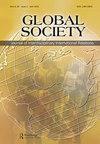Nigeria’s ‘Border Diplomacy’: Rhetoric or Substance for Regional Hegemonic Leadership?
IF 2.3
Q2 INTERNATIONAL RELATIONS
引用次数: 1
Abstract
ABSTRACT Following independence in 1960, Nigeria intentionally crafted a ‘big brother' honorific title for itself inspired by a Pan-Africanist Afrocentric ideology which it pursues through altruistic sharing of its human, military and economic resources. Successive governments have internalized this Africa-focused foreign policy thrust to establish a putative regional influence in Africa. However, despite belatedly signing the African Continental Free Trade Agreement which seeks to increase intra-African trade and introducing a novel visa-on-arrival policy for African passport holders, the porosity of Nigeria's boundaries continues to pose a threat and has led to the closure of land borders with its West African neighbours in August 2019. This article examines the implications of Nigeria's schizophrenic ‘border diplomacy' for its continental leadership and argues that the substance and rhetoric of the country's border diplomacy represent a foreign policy interest which prioritizes its people, economy and national security while normatively extending Nigeria’s hegemonic leadership in Africa.尼日利亚的“边境外交”:地区霸权领导的修辞还是实质?
摘要1960年独立后,尼日利亚有意为自己创造一个“老大哥”的尊称,其灵感来源于泛非主义的非洲中心意识形态,该意识形态通过无私分享其人力、军事和经济资源来追求。历届政府都将这一以非洲为重点的外交政策主旨内化,以在非洲建立公认的地区影响力。然而,尽管签署《非洲大陆自由贸易协定》(African Continental Free Trade Agreement)姗姗来迟,该协定旨在增加非洲内部贸易,并为非洲护照持有人推出了一项新的落地签证政策,但尼日利亚边界的漏洞仍然构成威胁,并导致其与西非邻国的陆地边界于2019年8月关闭。本文探讨了尼日利亚精神分裂的“边境外交”对其大陆领导层的影响,并认为该国边境外交的实质和措辞代表了一种外交政策利益,即优先考虑其人民、经济和国家安全,同时规范地扩大尼日利亚在非洲的霸权领导地位。
本文章由计算机程序翻译,如有差异,请以英文原文为准。
求助全文
约1分钟内获得全文
求助全文
来源期刊

Global Society
INTERNATIONAL RELATIONS-
CiteScore
3.10
自引率
6.20%
发文量
32
期刊介绍:
Global Society covers the new agenda in global and international relations and encourages innovative approaches to the study of global and international issues from a range of disciplines. It promotes the analysis of transactions at multiple levels, and in particular, the way in which these transactions blur the distinction between the sub-national, national, transnational, international and global levels. An ever integrating global society raises a number of issues for global and international relations which do not fit comfortably within established "Paradigms" Among these are the international and global consequences of nationalism and struggles for identity, migration, racism, religious fundamentalism, terrorism and criminal activities.
 求助内容:
求助内容: 应助结果提醒方式:
应助结果提醒方式:


